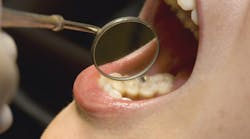Why you should perform oral cancer screenings on every dental patient
As a hygienist, my top priority is to keep patients healthy. One of the most important things I do to care for them is to screen for oral cancer. April is Oral Cancer Awareness Month, but screening for oral cancer is something we should do all year long. This year, the American Cancer Society estimates that 54,000 people will be diagnosed with oral cancer, and nearly 11,000 people will die from it.
Those numbers are too high, especially when we have the tools at our disposal to catch oral cancer before it’s too late. I’m sure we would all rather tell a patient, “I found something, but we caught it early and we can take care of it,” and not, “I’m so sorry.” During my 11 years in dental hygiene, I’ve witnessed oral cancer screenings save countless lives. I want to make sure every hygienist knows how to talk to patients about oral cancer, how to perform the best possible screenings, and how to remove any barriers to screenings.
Related articles
Oral cancer survivor just asks: Take a moment to save a life
Clinical lifesavers: Security in your oral cancer screening technology
Oral cancer screening: Resources for dental professionals
Be transparent about oral cancer screening
Every time a patient sits down in my chair in my Aspen Dental office, I’m open and honest about their oral care. Oral cancer screenings are an important part of regular preventive health care, no matter a patient’s age, smoking status, or other health-related behaviors. Patients are always surprised when I tell them that in its early stages, oral cancer does not hurt. By the time we see a bump or lesion with our naked eye, it’s usually too late and the cancer has progressed to stage three or stage four, and maybe even has spread to the lymph nodes and other parts of the body. Oral cancer screenings allow us to catch things early enough for intervention instead of waiting to see a bump or lesion.Use the best possible technologies to catch cancer early
Our office uses OralID and its fluorescence technology. By using its blue light, we can look deeper into the oral mucosa, seeing the green fluorescence of the normal healthy tissue and any abnormalities that appear much darker. This enables us to catch oral cancer as early as stage one.I recently had a new patient come in with a dime-size lesion under the tongue. When I used the OralID to examine the lesion in more detail, I could see it was actually the size of a quarter. With cancer that advanced, it’s likely the patient will lose much of the tongue and part of the jaw. If they had come in sooner, with the OralID and a proper screening we could have intervened long before the cancer progressed.
Remove barriers to regular oral cancer screenings
Patients tell us the biggest barrier to regular oral cancer screenings is money. While some dental insurance plans cover adjunctive oral cancer screenings, many do not. My patients often don’t want to spend the money on something they see as unnecessary. To overcome this, we’ve made the fee very affordable. Patients pay once a year, and every time they’re in my chair I perform the screening.I was recently performing an intraoral exam when I noticed some tissue discoloration. I recommended a screening, but the patient didn’t want to pay extra. I was deeply concerned by the abnormal area of tissue, so I offered the screening at no cost. With the OralID, I was able to see a dark patch under their tissue. The lesion ended up being cancer, and without the screening, the patient would not have known until the cancer had progressed even further.
Oral care is health care
Many patients think regular dental care is just about keeping their teeth clean and free of cavities, but as dental hygienists we know it’s much more than that. By examining patients’ mouths and necks, I can see evidence of heart issues, diabetes, cancer, and many other diseases.I talk to patients daily about what’s happening in their mouths and how it affects the rest of their bodies, and they’re always blown away, asking, “Why didn’t anybody tell me this before?” As hygienists and dental professionals, it’s our duty to empower patients with as much information about their health as we can, and oral cancer screening is one of the best tools we have to do just that.






